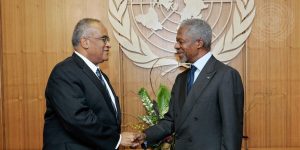 The African Leadership Centre in collaboration with Social Science Research Council, held a conference at Wilton Park from 23rd to 25th February 2015. Bringing together over 40 academics and policy practitioners from around the world, the conference focused on peacebuilding in Africa. It aimed, among other things, to examine the evolving challenges in the field, responses and what new thinking is emanating from the terrain. There were participants from core institutions operating in the peacebuilding terrain in Africa, including academics from universities and research centres to policy practitioners from the African Union, East African Community and the UN. The discussion was rich, touching on conceptual questions around definition of peacebuilding to empirical ones around the transformations in the terrain and how they are challenging old approaches to peacebuilding. The conference discussed innovations in African peacebuilding and alternative perspectives evident in peacebuilding interventions in Africa.
The African Leadership Centre in collaboration with Social Science Research Council, held a conference at Wilton Park from 23rd to 25th February 2015. Bringing together over 40 academics and policy practitioners from around the world, the conference focused on peacebuilding in Africa. It aimed, among other things, to examine the evolving challenges in the field, responses and what new thinking is emanating from the terrain. There were participants from core institutions operating in the peacebuilding terrain in Africa, including academics from universities and research centres to policy practitioners from the African Union, East African Community and the UN. The discussion was rich, touching on conceptual questions around definition of peacebuilding to empirical ones around the transformations in the terrain and how they are challenging old approaches to peacebuilding. The conference discussed innovations in African peacebuilding and alternative perspectives evident in peacebuilding interventions in Africa.
At issue from the first day of the conference was the central question of the nature of peacebuilding when perceived from an African perspective. More often than not, mainstream thinking defines peacebuilding work as a post-conflict issue. Yet in many cases, peacebuilding ought naturally to run the full gamut from pre-conflict to post-conflict environments. Participants argued that peacebuilding ought to occur as the set of interventions that aim to prevent the outbreak of conflict in situations where early warning mechanisms indicate cumulating danger of violent outbreak. The participants problematized the role of the state in the peacebuilding process in Africa. The question was posed, though not necessarily fully answered, whether it is possible to study peacebuilding in Africa without a proper understanding of the nature of the state, the character of the elite within and outside the state and the nature of the social contract between the state and society? This very question underscored the long term nature of the peacebuilding undertaking and process and provoked discussions about the role of key activities, like demobilisation, disbarment and reintegration, security sector reforms and elections, that mark the political process following a peace settlement.
The conference therefore noted that a short term engagement leads easily to relapse in conflict only a few years after peace settlement. At the conference, innovative engagements around peacebuilding processes were identified and discussed in parallel working groups. The role of regional players in the peacebuilding terrain was discussed as a conference participant from a regional organisation reminded participants that we have persisted in treating peacebuilding as that work done by the executive arm of government when there are many other players whose role in the terrain is useful and perhaps even more consequential. His comment brought home to the conference the tensions evident in peacebuilding initiatives between sovereignty-bound actors on the one hand and the local and transnational actors on the other hand.
This idea that peacebuilding initiatives go beyond the executive arm of government should of course be obvious as courts and national and regional legislatures have important roles. So too is the role of partnerships between communities of thought and practice, academics and policy practitioners. The partnerships between the African Leadership Centre and East African Legislative Assembly which has seen the provision of evidence-based policy thinking for the Assembly was cited as an initiative that needs upscaling. Conference participants also recommended that it should be possible, for instance, for the AU to partner with the range of existing academic institutions on the continent to provide solid research upon which the AU can base its policy engagements.
The conference, which was supported by the Carnegie Corporation of New York, marked an important moment. Coming only a few weeks after the UN Secretary General appointed an Advisory Group of Expert on the review of the UN Peacebuilding Architecture, the findings of the conference will certainly feed into the work of the Group of Expert. It is also planned that the ALC will join its partners to host a second follow-up conference later in the year in Addis Ababa, Ethiopia.




















